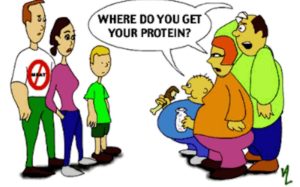
How common is protein deficiency in the developed world? Do those who only eat plant foods stand a greater chance of becoming protein deficient? Is the reason that people are generally smaller and thinner in the developing world because they are not cramming in enough beefburgers? A brief look at some research might help to answer these questions.
Blog Contents
Protein deficiency – fact or fiction?
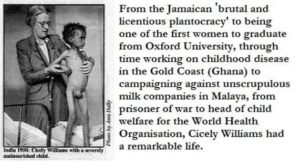 Since the 1950’s, a leading expert in the field, Cicely Williams 1 , was trying to convince the scientific community that the symptoms of malnutrition that she herself had associated with protein deficiency back in the 1930’s (something she named kwashiorkor 2 ) did not in fact relate to protein deficiency at all! Her attempt to debunk the protein=malnutrition link became known as the “great protein fiasco” 3 4 . Rather than being a protein deficiency, it appears 5 that changes in the microbiome (gut flora) could be responsible for the symptoms previously put down to insufficient protein. The latter study stated that: “Kwashiorkor, an enigmatic form of severe acute malnutrition, is the consequence of inadequate nutrient intake plus additional environmental insults. To investigate the role of the gut microbiome, we studied 317 Malawian twin pairs during the first 3 years of life…These findings implicate the gut microbiome as a causal factor in kwashiorkor.”
Since the 1950’s, a leading expert in the field, Cicely Williams 1 , was trying to convince the scientific community that the symptoms of malnutrition that she herself had associated with protein deficiency back in the 1930’s (something she named kwashiorkor 2 ) did not in fact relate to protein deficiency at all! Her attempt to debunk the protein=malnutrition link became known as the “great protein fiasco” 3 4 . Rather than being a protein deficiency, it appears 5 that changes in the microbiome (gut flora) could be responsible for the symptoms previously put down to insufficient protein. The latter study stated that: “Kwashiorkor, an enigmatic form of severe acute malnutrition, is the consequence of inadequate nutrient intake plus additional environmental insults. To investigate the role of the gut microbiome, we studied 317 Malawian twin pairs during the first 3 years of life…These findings implicate the gut microbiome as a causal factor in kwashiorkor.”
Problem…what problem?
We’e already looked at the specific question of whether plant-eaters need to worry about getting enough protein (specifically whether they need to combine foods to ensure they get the right balance of essential amino acids) 6 ; but if we’ve known for ages that there’s no real evidence that protein deficiency is something that we should worry about (if, that is, you’re eating enough food – pretty much any form of food, animal- or plant-based), why is it that the medical and nutritional scientific fields have been harping on about it for so long?
A 1979 study 7 gave us an early insight, when it stated that: “The dispassionate objectivity of scientists is a myth. No scientist is simply involved in the single-minded pursuit of truth, he or she is also engaged in the passionate pursuit of research grants and professional success. Nutritionists may wish to attack malnutrition, but they also wish to earn their living in ways they find congenial.” Regarding this perspective, Dr Michael Greger 8 adds that: “This inevitably encourages researchers to “make a case” for the importance of their own portion of the field, and “their nutrient,” which was protein.”
This suggestion that we don’t have too much of a problem getting enough protein in our diets has been greatly supported by the work of Dr T Colin Campbell 9 , who showed that anything above 5% protein in our daily diet is sufficient to keep us healthy – indeed, once you start getting over around 12% protein (specifically animal protein, of course), Dr Campbell showed that it can be seriously harmful to our health – instigating cancer initiation, promotion and progression 10 11 .
From dangerously high levels of protein being recommended back in the 1940’s, the amount recommended has fortunately been dropping ever since, as can been seen from the following historical chart for 1 year old children taken from a 2005 study 12 .
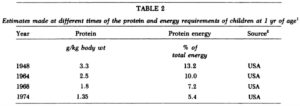
However, even today there are still those who obsess about protein, particularly those who advocate Palaeolithic diets 13 .
Perfect human protein source
So, what’s the perfect source of protein for humans – that with the best balance of amino acids and at the ideal percentage within each mouthful? Human breast milk 14 15 .
So is human breast milk really high in protein? Not at all – it’s actually one of the lowest protein milks in the mammalian kingdom 16 17 . In fact, it’s possibly the lowest protein-rich milks of any animal in the world – at less than 1% protein content by weight 18 . The following chart, taken from the latter study, shows some revealing comparisons.
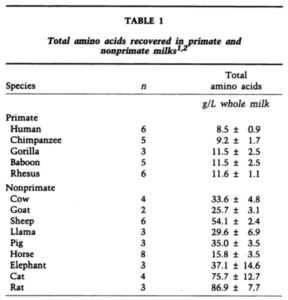
Cow’s milk can kill
This has serious negative health implications for those babies and children being fed cow’s milk – implications that can be so serious that some studies 19 have warned that feeding such high-protein milk (or substitute formula with similarly high levels of protein) can even be fatal to the baby.
This whole subject of the dangers of cow’s milk (really better described as “baby calf growth fluid“) has been covered in a previous blog 20 .
How much protein do adults need?
We’re talking about humans here, of course. Adults require no more than 0.8-0.9 grams of protein per kilogram of lean body weight per day 21 . Indeed, the following chart, taken from the latter research, indicates that some people don’t even need that much protein.
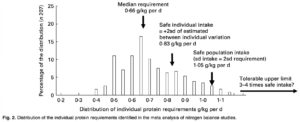
Protein excess is more likely
Eating too much rather than too little protein is the real ‘protein problem’ our society faces, as pointed out by T Colin Campbell 22 and in other studies 23 .
The latter study considers that long-term high protein diets may include the following risks:
- disturbed bone and calcium balance
- kidney function disorders
- an increased risk of various cancers
- liver disorders
- coronary artery disease
The latter 2013 study concludes that: “…there is currently no reasonable scientific basis to recommend protein consumption above the current recommended daily allowance, due to its potential disease risks.”
Protein deficiency – One less thing to worry about
So, I hope that’s put your mind at rest if, that is, you ever lose sleep over whether or not you are getting enough protein, particularly if you are eating a WFPB diet. Plants contain all the protein you need, as can be seen in a previous blog 24 and from the following video by Dr Michael Greger 25 .
References
- Wikipedia: Cicely Williams [↩]
- Malawi Med J. 2009 Sep; 21(3): 96–100. PMCID: PMC3717488. PMID: 20345016. 75 years of Kwashiorkor if Africa. Geert Tom Heikens and Mark Manary. [↩]
- D S McLaren. The great protein fiasco. Lancet. 1974 Jul 13;2(7872):93-6. [↩]
- D S McLaren. The great protein fiasco revisited. Nutrition. 2000 Jun;16(6):464-5. [↩]
- M I Smith, T Yatsunenko, M J Manary, I Trehan, R Mkakosya, J Cheng, A L Kau, S S Rich, P Concannon, J C Mychaleckyj, J Liu, E Houpt, J V Li, E Holmes, J Nicholson, D Knights, L K Ursell, R Knight, J I Gordon. Gut microbiomes of Malawian twin pairs discordant for kwashiorkor. Science. 2013 Feb 1;339(6119):548-54. [↩]
- THE PROTEIN COMBINING MYTH – A RAT’S TALE ? [↩]
- J P Rivers. The profession of nutrition–an historical perspective. Proc Nutr Soc. 1979 Sep;38(2):225-31. [↩]
- Video: The Great Protein Fiasco. Michael Greger M.D. FACLM June 27th, 2016 Volume 31 [↩]
- Animal Protein “Turns On” Cancer Genes – T. Colin Campbell PhD [↩]
- Casein in Dairy = Cancer in Humans? [↩]
- How Much Protein Do We Need? RDA vs. Dietary Guidelines. June 1, 2012. By Micaela Karlsen, MSPH for T Colin Campbell’s Centre for Nutrition Studies. [↩]
- G Cannon. The rise and fall of dietetics and of nutrition science, 4000 BCE-2000 CE. Public Health Nutr. 2005 Sep;8(6A):701-5. [↩]
- K J Carpenter. Protein requirements of adults from an evolutionary perspective. Am J Clin Nutr. 1992 May;55(5):913-7. [↩]
- J D Speth. Protein and Breast Milk. The Paleoanthropology and Archaeology of Big-Game Hunting: Protein, Fat, or Politics. [↩]
- Pediatr Clin North Am. 2013 Feb; 60(1): 49–74. Human Milk Composition: Nutrients and Bioactive Factors. Olivia Ballard, JD, PhD (candidate) and Ardythe L. Morrow, PhD, MSc [↩]
- Breast Milk, Diet, and Large Human Brains. ShannenL.Robson. Department of Anthropology, 270 South 1400 East, Room 102, University of Utah, Salt Lake City UT 84112, U.S.A. ([email protected]). 6 i 04. [↩]
- Annu Rev Nutr. 2007;27:123-48. Evolution of infant and young child feeding: implications for contemporary public health. Sellen DW. [↩]
- T A Davis, H V Nguyen, R Garcia-Bravo, M L Fiorotto, E M Jackson, D S Lewis, D R Lee, P J Reeds. Amino acid composition of human milk is not unique. J Nutr. 1994 Jul;124(7):1126-32. [↩]
- E E Ziegler. Adverse effects of cow’s milk in infants. Nestle Nutr Workshop Ser Pediatr Program. 2007;60:185-96; discussion 196-9. [↩]
- Cow’s Milk – But It Looks So Innocent… [↩]
- D J Millward. Identifying recommended dietary allowances for protein and amino acids: a critique of the 2007 WHO/FAO/UNU report. Br J Nutr. 2012 Aug;108 Suppl 2:S3-21. [↩]
- T. Colin Campbell, PhD: Link Between Dairy Protein, Casein, & Cancer [↩]
- I Delimaris. Adverse Effects Associated with Protein Intake above the Recommended Dietary Allowance for Adults. ISRN Nutr. 2013 Jul 18;2013:126929. [↩]
- 10 Protein-Rich Plant Foods Your Muscles Will Love [↩]
- Do Vegetarians Get Enough Protein? Michael Greger M.D. FACLM June 6th, 2014 Volume 19 [↩]